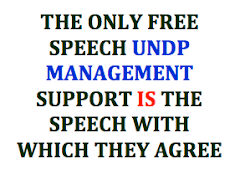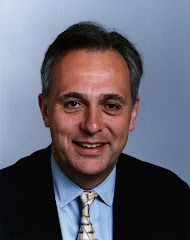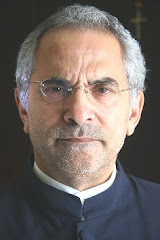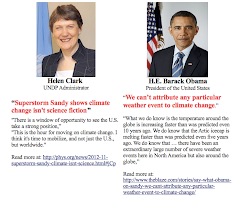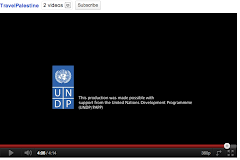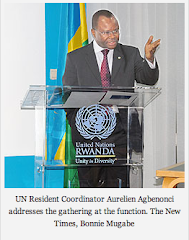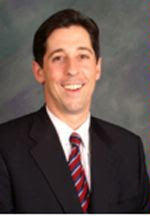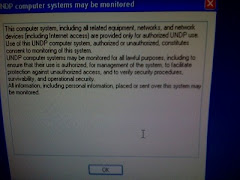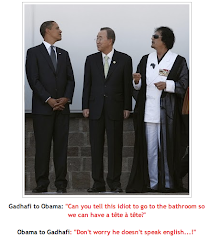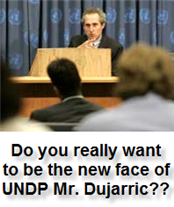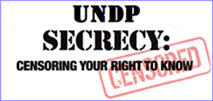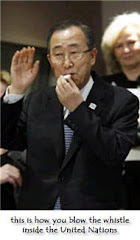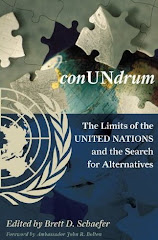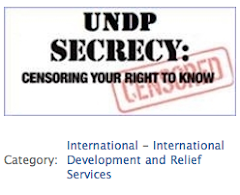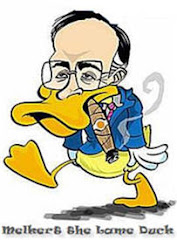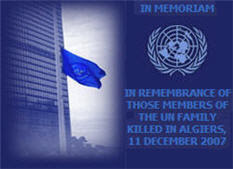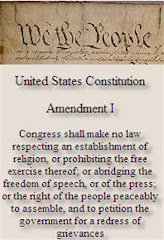Monday, March 31, 2008
Independence of U.N. Probes in Doubt
By BENNY AVNI | March 31, 2008
There are troubling signs that two ongoing U.N. investigations may be less thorough and independent than advertised.
The events the two U.N. teams are examining could hardly be more different. One was a vicious terrorist bombing in Algiers that targeted the United Nations as a symbol hated by jihadists and resulted in allegations of U.N. and Algerian security lapses. The other surrounds reports that the main development arm of the United Nations violated its own rules by cozying up to the North Korean regime and its leader, Kim Jong-Il.
The U.N. Development Program’s cooperation with the government of a country known at Turtle Bay as the Democratic People’s Republic of Korea seemed so cozy, in fact, that detractors begun calling the joint operation “UNDPRK.” As more and more articles appeared in the press on the UNDP-North Korea relationship, which the Wall Street Journal dubbed “Cash for Kim,” Secretary-General Ban, the UNDP administrator, Kemal Dervis, and the UNDP board of directors launched a full investigation.
In September, the “Independent Investigative Review of UNDP Operations in DPRK” was established, headed by a former Hungarian prime minister, Miklós Németh. The team was supposed to submit its report “if at all possible before the end of 2007.” It quickly dropped this ambitious deadline, however, and earlier this year promised to deliver its results by the end of March. But as the investigators pored over the documents and data, they realized they needed another postponement. The target date is now “before the end of May.”
Is procrastination or thoroughness to blame for the delays? Let’s hope it’s the latter. Privately, however, some are raising questions about at least two team members who may have UNDP ties. Agency officials have dismissed those ties as “tenuous,” saying they don’t violate the team’s mandate.
That mandate says team members should “not seek nor accept supervision or guidance” from anyone at the UNDP or the United Nations, and should “at all times avoid any conflict of interest or appearance of conflict with UNDP or its officials or personnel.” By definition, they should have no U.N. ties.
The team’s chief of staff, Ji Mi Choi, has never worked directly with UNDP or the United Nations, the agency’s spokeswoman, Christina LoNigro, said. But Ms. Choi did serve as chief of staff at Columbia University’s Earth Institute and was top assistant to the institute’s director, Jeffrey Sachs. A prolific writer on development issues, Mr. Sachs has advised a former U.N. secretary-general, Kofi Annan, and has worked with Mr. Annan’s deputy and former UNDP administrator, Mark Malloch Brown, on such cornerstone UNDP projects as the U.N. Millennium Project.
Another member of the independent team investigating the North Korea program, Mary Ann Wyrsch, is chairwoman of the UNDP’s Audit Advisory Committee, created in 2006. Did the body Ms. Wyrsch heads do a good job overseeing and advising the UNDP on its North Korea program? Ms. Wyrsch may face that question during the team’s investigation.
In the aftermath of the December 11, 2007, suicide attack on the U.N. headquarters in Algiers, Mr. Ban appointed a retired Algerian-born U.N. official, Lakhdar Brahimi, to lead an “independent panel on the safety and security of United Nations staff worldwide.” Skeptics wondered whether Mr. Brahimi, known to be loyal to his former bosses both at the United Nations and in the Algerian government, could ever find fault with either. But he may not need to: His mandate, carefully arranged between Turtle Bay and Algiers, might be too broad to investigate the specifics of the December attack.
“Without accountability, there is impunity,” the president of the U.N. Staff Union, Stephen Kisambira, told Mr. Ban in a letter expressing U.N. staffers’ dissatisfaction with the makeup of the Algiers investigative team. “We ask that you not be complicit in a cover-up,” he added. “The staff is sick and tired of the impunity extended by the office of the Secretary-General to senior managers for their failings.”
To allay such concerns, the two investigative teams will have to show that their efforts have not added up to a cover-up, as usual. Despite the worrisome signs, let’s wait for the outcome of both.
bavni@nysun.com
Letter to UNDP Watch on Algeria bombing
 It has been 3 months now since the last posting to UNDP Watch to air the blood soaked laundry of UNDP and its negligence in Algeria which cost the lives of 13 of our colleagues and the gross mismanagement of the Security Unit for UNDP. 3 months to take action to prevent another Algeria. 3 months to make the changes in the Security Unit to make sure that rules and regulations are followed in hiring and that the falsely titled deputy chief is removed. But what has happened?
It has been 3 months now since the last posting to UNDP Watch to air the blood soaked laundry of UNDP and its negligence in Algeria which cost the lives of 13 of our colleagues and the gross mismanagement of the Security Unit for UNDP. 3 months to take action to prevent another Algeria. 3 months to make the changes in the Security Unit to make sure that rules and regulations are followed in hiring and that the falsely titled deputy chief is removed. But what has happened?UNDP executive board has given over 30 million dollars to the Security Unit to provide for our safety after Algeria. Of course Mr. Jab Swart has been placed in charge of managing this fund again, even following his inability to give funds to Algeria when it was needed most. Each region was asked to prioritize the needs for using these funds. each responsible regional security unit focal point reviewed and approved these requests. The security unit budgeting manager reviewed and validated these requests.The Administrator and Associate Administrator have reminded everyone that security is the highest priority and that the funding is available to help protect us. But what has happened in this 3 months? NOTHING.
Mr.Jab Swart sits on his deputy chief's throne and 'manages' this fund. If you ask anyone they refer to this fund as "Jab's fund". Funds for some moving of UNDP offices have been proposed but not a penny has been issued. Almost every UNDP country office where you and I work every day far from Mr. Jab Swart in his private ofice in New York have asked for funds. What have we received NOTHING.
Mr. Jab Swart was keen to use "his" fund last year to give funds to projects he personally endorsed such as thousands for countries in Europe where his friends worked. Many thousands for other countries where there was a lesser threat than in Algeria, where again Mr. Jab Swart's friends worked or where he had worked himself. But Algeria was given funds for only some radios. How did Mr. Jab Swart think that a few radios would help against a bomb? In Mr. Jab Swart's management of security it is more important to but an armoured truck for his friends in Somalia where the staff worked from a safe hotel most of the time. For Algeria Mr. Jab Swart did virtually NOTHING.
With the blood of 13 UN colleages on his hands it could be expected that Mr. Jab Swart would be eager to make right and do for us what he refused to do for Algeria. But he has done NOTHING.
In Africa we have a saying: Rain beats a leopard's skin, but it does not wash out the spots. The rain of our colleagues' blood was not enough even to wash out Mr. Jab Swart's spots of incompetence. His background is not security and he is an incompetent manager and UNDP administration has not seen fit to remove him. Again my friends, what has been done NOTHING.
Perhaps Mr. Brahimi and his investigating team will see the truth behind Mr. Jab Swart's spots. But I and many others expect the usual NOTHING.
Sunday, March 30, 2008
Oud-minister Herfkens is al te snel met een morele last opgezadeld
 Zoveel staat vast dat oud-minister Eveline Herfkens in de periode 2002 tot 2006 ten onrechte een kwart miljoen dollar heeft gekregen van het ministerie van buitenlandse zaken, toen zij in New York bij de VN-organisatie UNDP werkte. Dat geld was bedoeld als tegemoetkoming in de huurkosten, maar dat was in strijd met de reglementen van de volkerenorganisatie. Die bepalen dat haar medewerkers onafhankelijk van individuele staten hun werk moeten doen en uit dien hoofde geen cent van een individueel land mogen ontvangen.
Zoveel staat vast dat oud-minister Eveline Herfkens in de periode 2002 tot 2006 ten onrechte een kwart miljoen dollar heeft gekregen van het ministerie van buitenlandse zaken, toen zij in New York bij de VN-organisatie UNDP werkte. Dat geld was bedoeld als tegemoetkoming in de huurkosten, maar dat was in strijd met de reglementen van de volkerenorganisatie. Die bepalen dat haar medewerkers onafhankelijk van individuele staten hun werk moeten doen en uit dien hoofde geen cent van een individueel land mogen ontvangen.In al haar eenvoud is het een glasheldere regeling. Het zou een mooie boel worden als VN-medewerkers betaald worden door afzonderlijke landen, laat staan door het land van herkomst. Voor wat hoort wat, niet waar? Voor je het weet laten zulke medewerkers hun oren hangen naar hun begunstiger, wat onmogelijk de bedoeling kan zijn van de VN, die in dienst staat van de volkerengemeenschap als geheel. Het was daarom op zijn minst rijkelijk naïef van Herfkens dat zij met deze tegemoetkoming instemde, of er misschien wel om heeft gevraagd, zoals nader onderzoek moet uitwijzen.
Wat deze kwestie gecompliceerd maakt is dat Herfkens gebruik meende te mogen maken van een bestaande regeling. Zo kregen andere Nederlanders op vergelijkbare posten ook een vergoeding, waarmee vaststaat dat ook het departement fout zat. Vanzelfsprekend ontslaat dit Herfkens niet van haar plicht de VN-regels na te leven. Zij houdt echter vol dat zij die niet kende en dat niemand haar daarop heeft aangesproken. Als gezegd, dat is naïef en formeel redenerend zit ze daarmee ook fout: iedereen wordt geacht de wet te kennen.
Het is echter een fout die op zijn minst mede in het leven is geroepen door het departement. Die wetenschap dwingt tot enige terughoudendheid. Maar die kon de politiek in het geval Herfkens niet opbrengen. Het begon ermee dat PvdA-leider Bos haar de fout geducht inpeperde, vervolgens heeft het kabinet haar gevraagd de vergoeding terug te betalen en het eindigde ermee dat de Tweede Kamer dit verzoek in een eis wenste om te zetten. Daarmee werd de oud-minister met een morele last opgezadeld, terwijl het onderzoek in deze kwestie nog in volle gang is. Zowel hier als in Washington.
Onder deze omstandigheden restte minister Verhagen weinig anders te vermelden dat hij juridisch geen been heeft om op te staan. Dat is al te mager om een ex-collega met een morele last op te zadelen.
Friday, March 28, 2008
Dervis orders his office in Lebanon to fix website, while infiltrated hizbollah elements in Lebanon office continue to quote wrong facts on 2006 war

After the publication of the UNDP's omitting the existence of Israel bordering Lebanon and despite immediate move from Kemal Dervis office to order fix-es on the UNDP Lebanon Website (click here) , infiltrated Hezbollah elements in UNDP Lebanon continue to state wrongfully facts about the war of 2006.
UNDP Lebanon continue to state that:
Moreover, the war by Israel against Lebanon in July 2006 was devastating to
the economy.
The continuing denial of UNDP to officially recognize Israel, and the truth of who waged war on whom in 2006, is a sign that UNDP's problems continue to persist and are rather structured deep in its management.
UNDP management is totally silent during the last 18 months of political crisis that have embraced Lebanon from the Hezbollah and Syrian backers who don't want to elect a president and are pushing the country to the verge of major economic and social chaos.
United Nations Secretariat have a complete different picture of the situation in Lebanon and 2006 war.
UNDP Watch is taking the liberty to quote from UN's main website version of the war:(http://www.un.org/Depts/dpko/missions/unifil/background.html)
“New hostilities on the Israeli-Lebanese Border started on 12 July 2006 when
Hizbollah launched several rockets from Lebanese Territory across the BlueLine
towards IDF positions . . . In parallel, Hezbollah fighters crossed the Blueline
and attacked an Israeli patrol and captured two Israeli soldiers, killed three
others and wounded two more".
UNDP Erases Israel, Discovers New Country
The UNDP purports to be "the UN’s global development network, an organization advocating for change and connecting countries to knowledge, experience and resources to help people build a better life," and it would seem that some of their colleagues on the ground in Lebanon are advocating a change of their own, taking liberties with regard to content by listing Palestine as its neighbor to the south.
From the United Nations Development Programme page About Lebanon:
The Lebanese Republic is a small, mostly mountainous country in the Western
Asia, on the eastern shore of the Mediterranean Sea. It is bordered by Syria to
the north and east, and Palestine to the south. Due to its sectarian diversity,
Lebanon follows a special political system, known as confessionalism, to
distribute power as evenly as possible among different sects...
Don't worry, though. The UNDP recognizes Israel when it has something to blame it for, from the same page of UNDP Lebanon you read that:
...Moreover, the war by Israel against Lebanon in July 2006 was devastating toIt seems that Kemal Dervis and Martha Ruedas do not care anymore about United Nations version on the war of 2006.
the economy. A very promising tourist season and strongly resurgent economic
activity were interrupted, employment opportunities reduced and unemployment
increased...
UNDP Watch is taking the liberty to quote from UN's main website version of the war:(http://www.un.org/Depts/dpko/missions/unifil/background.html)
“New hostilities on the Israeli-Lebanese Border started on 12 July 2006 when Hizbollah launched several rockets from Lebanese Territory across the BlueLine towards IDF positions . . . In parallel, Hizbollah fighters crossed the Blueline and attacked an Israeli patrol and captured two Israeli soldiers, killed three others and wounded two more".
But since lately Ban Ki-moon seem to agree with everything UNDP does - maybe he agrees with President of Iran and Syria that Israel "does not exist".
UNDP Watch and all UNDP staffers around the world call for immediate resignations of Kemal Dervis and Martha Ruedas, and demand an open investigation to how and who instigated such actions.
Here is the UNDP Lebanon Web-Site

Herfken's Secret Memo shows she personally negotiated her house subsidy in 2002
Kemal Dervis = lied about Herfkens;
Ad Melkert = lied about Herfkens;
David Morrison = lied about Herfkens;
and finally
Ban Ki-moon = lied about Herfkens;
UNDP Watch is publishing the letter in original (click here for pdf version)
 For how long can these UN managers think that they will go unpunished?
For how long can these UN managers think that they will go unpunished?
Rentgate damages reputations
 27-03-2008
27-03-2008by political editor John Tyler
Dutch Foreign Minister Maxime Verhagen had some explaining to do in parliament on Thursday. Members of the opposition accused him of misinforming parliament in a scandal involving a former Dutch politician, the United Nations, and a luxury New York apartment.
The controversy centres around former Labour Party Development Minister Eveline Herfkens, and a rental subsidy she received from the Dutch government while working for the UNDP. Starting in late 2002, Ms Herfkens received $7,000 per month to pay for a luxury apartment in New York City. Over the years, her living arrangements cost the Dutch taxpayer $280,000.
Against UN rules
It came to light last year that this arrangement was against UN rules. For this and other reasons, the UNDP put Ms Herfkens on non-active status, and both the UN and the Dutch government opened inquiries to find out who was responsible.
On the basis of his own inquiries, Foreign Minister Verhagen informed parliament that it was not possible to ascertain who had initiated the subsidy construction - Mrs Herfkens or the foreign ministry.
But this week a member of the Socialist Party produced an internal foreign ministry memo, dated October, 2002, in which the ministry seems to suggest the subsidy construction. This led to the accusation that Minister Verhagen was holding something back.
Mr Verhagen vehemently denies that he has been less than fully cooperative. He says prior to the October memo, there was at least one meeting between Ms Herfkens and foreign ministry officials.
"It's absolutely not true that I misinformed parliament. I told parliament that it's not obvious which side took the initiative for getting the rental subsidy. I can't see, in all the documents, who took the initiative, Ms Herfkens or the government."
MPs want their money back
In addition to finding out how this situation came to pass, a majority in parliament would also like Herfkens to pay the money back. Mr Verhagen says the chance of this happening is very small. She has already declined a request to return the subsidy voluntarily, and the Foreign Minister thinks the government does not have a good legal case to force her to do so.
But many parliamentarians disagree. Member of parliament from the Conservative VVD party, Arend Jan Boekestijn, says he will submit a motion requiring Herfkens to reimburse the government, and he thinks a majority in parliament will support it.
Asked how Minister Verhagen comes out of the affair, Mr Boekestijn replied:
"Weakened. But that's also his own position because he admitted that the foreign ministry did a very bad job."
World Bank Corruption: WB Action “Too Little, Too Late” to Correct HIV Corruption Bank Uses CDC in Cover-Up; India Project Riddled With Wrongdoing

March 19, 2008
FOR IMMEDIATE RELEASE
Contact: Bea Edwards, International Director
Phone: 202.408.0034 ext 155, 202.841.1391
Email: beae@whistleblower.org
Contact: Dylan Blaylock, Communications Director
Phone: 202.408.0034 ext 137, 202.236.3733 (cell)
Email: dylanb@whistleblower.org
World Bank Action “Too Little, Too Late” to Correct HIV Corruption
Bank Uses CDC in Cover-Up; India Project Riddled With Wrongdoing
(Washington, D.C.) – After nearly one year’s delay, the World Bank announced last Thursday that it will further investigate disclosures involving the distribution of defective HIV/AIDS test kits, mass purchased as part of a health care project in India. GAP client Dr. Kunal Saha first informed the Bank’s Department of Institutional Integrity (INT) of the use of the faulty kits in a draft report in May 2007. In the ensuing months, various World Bank officials have attempted to conceal the facts about the case, discredit Dr. Saha in both the US and India, and use the US Center for Disease Control (CDC) to cover-up fraud. Statements made by World Bank officials to the media last week about this issue were grossly misleading.
As an investigator hired by INT, Dr. Saha compiled compelling evidence that defective kits were purchased with World Bank funds and supplied by the Indian government to hospitals and blood banks across the country. The kits, distributed by Monozyme, Ltd., gave ‘false negative’ results: HIV-contaminated blood was not reliably detected by these kits and could therefore be accepted for use in transfusions.
In December of last year, as articles appeared in the Indian press focusing on the widespread use of defective HIV test kits, the Bank and the Government of India solicited a misleading statement from a laboratory testing expert at the CDC vouching for the kits’ accuracy. The National AIDS Control Organization of India (NACO), which works with the Bank, stated to the Indian press:
The documents cited by Dr. Saha have been reviewed by Dr. Robert Martin, associate Director, Coordinating Centre for Health and Information Services, Centres for Disease Control and Prevention, USA who is also of the view that there is no evidence of use of poor quality HIV test kits in India and his allegations have no basis.
That press release can be found here: http://pib.nic.in/release/release.asp?relid=34037
Less than two months later, however, when obliged to release its own Detailed Implementation Review (DIR), the Bank was forced to acknowledge the validity of the claims made by Dr. Saha some seven months earlier – a direct contradiction of the CDC expert’s statements.
“Dr. Saha’s report should have raised red flags about a potential public health emergency in India,” said Bea Edwards, International Program Director at GAP. “Rather than acting immediately to arrest the potential spread of HIV through the World Bank project, however, the Bank instead sought to use the CDC to conceal the fraud.”
The World Bank DIR can be found here: http://siteresources.worldbank.org/INTDOII/Resources/WB250_Web_Vol2_012408.pdf
Background/Timeline
Saha is a recognized expert in the field of HIV/AIDS research with two decades of research and clinical experience. The World Bank’s anti-corruption unit, INT, retained him in March 2007 as part of a six-member team to review India’s Second National HIV/AIDS Control Project (NACP II), financed with $191 million in Bank funds. Saha, after working as a senior HIV/AIDS researcher at the Columbia University in New York and Ohio State University in Columbus, Ohio for more than 12 years, recently moved to work for a private organization.
After finding evidence that defective kits were in use, Saha notified INT of the immediate danger to public health. He found that although the local branches of NACO had received multiple complaints about the HIV test kits as early as October 2004, the agency had not acted to withdraw the kits. When the media in India and Europe reported complaints about the Monozyme kits in 2006, a NACO spokesperson dismissed the allegations, saying that the problem was confined to the state of West Bengal that year and that NACO had already addressed it.
Dr. Saha, however, possessed test data showing that the Monozyme kits were still in use in April 2007 in Chhattisgarh – a state in central India. (For some of this evidence, click here: http://www.whistleblower.org/doc/2007/Use%20of%20Monozyme%20HIV%20test%20kits%20April%20'07.pdf)
When no action resulted from the submission of his report to INT, Dr. Saha took his concerns to the Indian press. In response, a Bank official told the Hindustan Times: “The findings are personal opinions which the researcher has reached independently, and do not reflect the views of the World Bank.” (For this article, click here: http://www.hindustantimes.in/StoryPage/StoryPage.aspx?id=57bcc168-22b8-47b9-9d32-b497494392de)
In that same article, the Indian government tried to defame and discredit Dr. Saha: “This investigator has no credibility. The World Bank has not complained to NACO at all about defective HIV-kits being used in India,” a NACO spokesman stated.
In August, Dr. Saha contacted GAP and shortly thereafter presented his evidence in a face-to-face meeting with Bank officials. In response to this presentation, the Senior Institutional Integrity Officer wrote him on August 23, 2007:
We found the meeting both instructive and helpful. We recognize the need to follow up quickly on the issues you have raised and to that end would like to use your information in discussion with persons outside the Bank. [Emphasis added]
The follow-up, however, became a cover-up. A month later, Dr. Kees Kostermans, the Bank’s lead public-health specialist in South Asia, told the Washington Post that the Bank had no “specific evidence” that HIV had been transmitted in India because of faulty diagnostic kits. “Specific evidence” that a defective diagnostic kit may have transmitted a virus like HIV requires an analysis of both hospital/blood bank data, and the medical records of the patients in the follow up clinics – precisely the investigative procedure that the Bank should have started immediately but did not.
“This is like a judge blocking a case from going to trial, then stating that the jury’s failure to reach a verdict validates his dismissal of the charges,” added Edwards. (For that Post article: http://www.washingtonpost.com/wp-dyn/content/article/2007/09/27/AR2007092702320.html)
In December, the Bank solicited an opinion from Dr. Martin, CDC expert on the use of faulty HIV test kits procured by the Indian project. Dr. Martin did not consult Dr. Saha, and the CDC (through its General Counsel) will not identify the evidence that Dr. Martin purportedly reviewed. Meanwhile, NACO issued the statement found above about Saha, based on Martin’s putative review.
Hard Evidence of a Cover-Up
In January the INT report on Indian health care projects was released by the World Bank, in order to comply with United States legislation regarding the disbursement of funds. The internal report confirmed Dr. Saha’s allegations and more. The report’s revelations include:
- Two years of test results provided by one hospital which showed that the Monozyme-supplied SD Bioline kits were yielding a high false negative rate.
-Complaints from five Voluntary Counseling and Testing Centers to Municipal District AIDS Control Societies that Monzyme-supplied S.D. Bioline HIV ½ Rapid test kits were producing invalid, false negative and/or discordant results.
-Indicators of fraudulent and corrupt practices in the procurement of diagnostic test kits and blood bank equipment – particularly when conducted through decentralized procurement.
The World Bank’s own documentation showed that these kits had serious problems, but the data do not seem to have stopped Bank officials from launching a smear campaign against Dr. Saha, whose allegations they knew to be correct. The end result of the Bank’s lack of action is an increased likelihood that an unknown number of Indian citizens have contracted HIV.
Despite the public release of the INT report in January, the World Bank’s Kostermans told the Washington Post just last week that the HIV test kits were not faulty. At the same time the Bank issued a statement saying: “We take these indicators of fraud and corruption extremely seriously. Working with the Indian authorities, we will take action against those found responsible…” The Bank and the Indian Government, which for the past year have strenuously fought to conceal the fraud and the public health danger from the press, patients and the public, are now supervising the investigation into the corruption they tried to conceal and are assuming responsibility for disciplining those who are culpable.
“This pledge is not credible” said Edwards. “The Bank always seems to take corruption ‘extremely seriously’ when one of its projects is challenged. Unfortunately, it does not follow through and take action.”
Edwards went further, attacking the Bank-CDC relationship: “Now that all the information is in and we can see the whole picture, it appears that the World Bank used the CDC in a health project cover-up. How is it possible that the World Bank can so easily manipulate a flagship public health agency of the U.S. government to smear a medical expert and suppress news of a public health emergency?”
In order to further probe the irregularities at NACO, Saha’s attorney in Delhi has sought all pertinent information related to NACO’s handling of complaints about defective kits under the newly enacted “Right to Information Act” (RTI Act) in India. NACO has remained completely unresponsive, however, and failed to comply within the legally mandated time limit. Saha is presently appealing to the “Central Information Commission”, the highest authority to uphold the RTI Act in India.
Government Accountability Project
The Government Accountability Project is the nation’s leading whistleblower protection organization. Through litigating whistleblower cases, publicizing concerns and developing legal reforms, GAP’s mission is to protect the public interest by promoting government and corporate accountability. Founded in 1977, GAP is a non-profit, non-partisan advocacy organization with offices in Washington, D.C.
#####
Thursday, March 27, 2008
'Gebrek morel besef Herfkens'
 De Tweede kamer is laaiend dat oud PvdA-minister Eveline Herfkens ten onrechte een kwart miljoen Nederlandse huursubsidie in haar zak heeft gestoken toen ze bij de VN in New York werkte.
De Tweede kamer is laaiend dat oud PvdA-minister Eveline Herfkens ten onrechte een kwart miljoen Nederlandse huursubsidie in haar zak heeft gestoken toen ze bij de VN in New York werkte.Tijdens een debat over de kwestie in de Tweede kamer zei VVD'er Arend Jan Boekesteijn dat de ex-minister 'een gebrek aan moreel besef heeft'. De PVV spreekt van 'zakkenvullen' door de voormalig PvdA-bewindsvrouw.
Herfkens weigert vooralsnog de huursubsdie terug te storten. Ze kreeg het geld van het ministerie van buitenlandse zaken als tegemoetkoming voor haar huisvesting als werknemer van de Verenigde Naties in New York.
De PvdA'er wilde op loopafstand van de VN (een hele dure buurt) en op stand 'ik ga niet tegen een blinde muur aankijken', wonen. In een paar jaar tijd maakte het ministerie een kwart miljoen euro 'huursubsidie' over.
Het kabinet heeft Herfkens gevraagd het ten onrechte betaalde geld terug te geven, zo zei minister Maxime Verhagen (Buitenlandse Zaken). Juridisch ligt dat heel moeilijk, stelt het kabinet. Tegen Elsevier zei Herfkens dat ze 'geen tijd' had om de regels over wel of niet accepteren van huursubdie te lezen. Ironisch genoeg zet de PvdA'ster zich bij de VN in voor 'armoedebestrijding'. Het is bij de VN uitdrukkelijk verboden giften van regeringen aan te nemen.
Van cruciaal belang voor een succesvolle terugvordering is volgens Verhagen te weten of Herfkens bewust de regels overtrad en wie het initiatief heeft genomen tot de huurvergoeding: Herfkens zelf of Buitenlandse Zaken.
Herfkens mag geld vooralsnog houden
 Het kabinet kan de ruim tweehonderdduizend euro die oud-minister Eveline Herfkens (PvdA) onterecht heeft ontvangen als werknemer van de Verenigde Naties in New York, vooralsnog niet terugvorderen. Volgens minister van Buitenlandse Zaken Maxime Verhagen (CDA) is dat juridisch onmogelijk.
Het kabinet kan de ruim tweehonderdduizend euro die oud-minister Eveline Herfkens (PvdA) onterecht heeft ontvangen als werknemer van de Verenigde Naties in New York, vooralsnog niet terugvorderen. Volgens minister van Buitenlandse Zaken Maxime Verhagen (CDA) is dat juridisch onmogelijk.Herfkens hoeft huursubsidie niet terug te betalen 'Kabinet loog over Herfkens' Herfkens 'te druk' voor VN-regels Geen huis voor Herfkens?
Een rechtszaak heeft alleen kans van slagen als een lopend onderzoek van de VN uitwijst dat Herfkens wist dat ze de huursubsidie niet mocht aannemen, zei Verhagen donderdag tijdens een debat met de Tweede Kamer over de zaak. Hij heeft Herfkens wel gevraagd het geld uit vrije wil terug te betalen, maar wilde niet zeggen hoe zij daarop heeft gereageerd.
De oppositie vindt dat Herfkens, van 1998 tot 2002 minister voor Ontwikkelingssamenwerking, het bedrag van ruim tweehonderdduizend euro hoe dan ook moet terugbetalen. De coalitiepartijen CDA, PvdA en ChristenUnie zijn het met Verhagen eens dat dat alleen kan als wordt bewezen dat Herfkens wist dat zij het geld niet mocht aannemen.
D66-Kamerlid Fatma Koser Kaya stelde dat Herfkens van de regels op de hoogte had moeten zijn. "We hebben het over een oud-minister, niet over een of andere mevrouw die net de arbeidsmarkt op komt."
Verhagen bekende tijdens het debat dat de ambtenaren op zijn ministerie niet bekend waren met de VN-regel dat VN-personeel geen geld van derden mag aannemen, dus ook niet van hun land van herkomst. VVD-Kamerlid Arend Jan Boekestijn noemde dat 'ongelooflijk incompetent'.
Verhagen bleef erbij dat niet meer is vast te stellen of Herfkens zelf om de huursubsidie heeft gevraagd of dat het ministerie die haar heeft aangeboden. "Ik kan nu wel naar de rechter stappen en zeggen: kom op met dat geld, maar dat heeft weinig kans van slagen zolang niet duidelijk is of Herkens van de regels wist en of ze zelf om de vergoeding heeft gevraagd."
De openstaande vragen worden mogelijk beantwoord door het onderzoek dat is ingesteld door Herfkens' werkgever, het VN-ontwikkelingsprogramma UNDP. Een dezer dagen moet het klaar zijn, maar daarna moeten de juridische afdeling van de UNDP en de directeur van de organisatie er nog hun licht over laten schijnen. Hoe lang dat duurt, kon Verhagen niet zeggen.
Herfkens heeft eerder gezegd dat zij de huursubsidie nodig had omdat ze op loopafstand van het VN-kantoor wilde wonen, in een appartement van minstens honderd vierkante meter. Dat daar in Nederland ophef over ontstond, noemde ze 'ontstellend provinciaal'. Diverse prominente PvdA'ers, onder wie partijleider Wouter Bos, lieten Herfkens daarna vallen.
Wednesday, March 26, 2008
'Kamer is voorgelogen in kwestie-Herfkens'
 dinsdag 25 maart 2008 21:13
dinsdag 25 maart 2008 21:13De ministers Bert Koenders (Ontwikkelingssamenwerking, PvdA) en Maxime Verhagen (Buitenlandse Zaken, CDA) hebben de Tweede Kamer tot twee keer toe onjuist geïnformeerd over de ruim 200.000 euro die oud-minister Eveline Herfkens (PvdA) ten onrechte heeft ontvangen.
Buitenlandse Zaken bood Herfkens de huursubsidie aan
Uit een interne notitie die de SP in bezit heeft blijkt dat het ministerie van Buitenlandse Zaken het bedrag, door Herfkens gebruikt voor een royaal appartement in New York, wel degelijk zelf heeft aangeboden aan de Herfkens.
Koenders en Verhagen schreven in februari dit jaar dat behalve Herfkens, nog zeven andere Nederlanders een vergoeding hebben gekregen die in strijd was met de regels van de Verenigde Naties.
Onduidelijk
Maar omdat volgens Koenders en Verhagen niet duidelijk was of Herfkens om het geld had gevraagd, of dat het haar was aangeboden, kon het ten onrechte verschuldigde bedrag niet zomaar worden teruggevorderd.
Herfkens houdt vol dat het geld haar werd aangeboden en dat zij het te druk had om zich met de gedragsregels van de VN bezig te houden: 'Had ik dat dan moeten controleren? Wie zou ooit denken dat iets wat de Nederlandse regering doet, tegen de regels is? Nederland is zo'n on-ge-loof-lijk braaf land.'
In de notitie staat dat 'gelet op de hoogte van het inkomen en de kosten van het levensonderhoud' in New York, het 'duidelijk zal zijn dat de huurkosten niet uit het VN-salaris' kunnen worden betaald. Daarom wordt voorgesteld Herfkens een vergoeding te geven.
Terugbetalen
De SP en de VVD vinden dat Verhagen de Tweede Kamer hiermee twee keer onjuist heeft geïnformeerd. 'Dat is een politieke doodzonde,' stellen beide partijen in actualiteitenprogramma EenVandaag.
De SP en de VVD eisen opheldering van de minister. Ook moeten Herfkens en de andere Nederlanders het geld alsnog moeten terugbetalen.
Lees ook de weblogs Eveline Herfkens, wat een bespottelijk wezen van Liesbeth Wytzes en De Derde-Wereld-graaiers van de PvdA en de VN van Afshin Ellian
Door Robbert de Witt
Ministerie bood Herfkens vergoeding aan
 HILVERSUM - De permanente vertegenwoordiger van Nederland in New York heeft zelf in 2002 voorgesteld aan het ministerie van Buitenlandse Zaken om oud-minister Eveline Herfkens de omstreden vergoeding voor de huur van haar woning in New York te geven.
HILVERSUM - De permanente vertegenwoordiger van Nederland in New York heeft zelf in 2002 voorgesteld aan het ministerie van Buitenlandse Zaken om oud-minister Eveline Herfkens de omstreden vergoeding voor de huur van haar woning in New York te geven.Dat blijkt uit een intern memo dat de SP in handen kreeg. Zowel de SP als de VVD wil opheldering van minister Maxime Verhagen (Buitenlandse Zaken), zeiden zij dinsdag in televisieprogramma Eenvandaag. Verhagen schreef eerder twee keer aan de Kamer dat niet te achterhalen valt wie het initiatief nam tot de verboden vergoeding.
Eveline Herfkens raakte vorig jaar in opspraak toen bleek dat zij tijdens haar baan bij de VN-organisatie UNDP jarenlang een vergoeding van het ministerie van Buitenlandse Zaken had gekregen, die in strijd is met de regels van de Verenigde Naties. Vooral haar partijgenoot PvdA-leider Wouter Bos viel haar zwaar af en stelde dat zij niet alleen zichzelf en Nederland, maar ook de PvdA schade had toegebracht.
Verhagen schreef in februari dit jaar dat behalve Herfkens, nog zeven andere Nederlanders een vergoeding hebben gekregen die in strijd was met de regels van de Verenigde Naties.
Herfkens heeft zelf altijd gezegd dat ze niet om het geld vroeg, maar dat het haar was aangeboden toen zij vroeg om hulp bij het zoeken naar een appartement. De memo uit oktober 2002 bevestigt dat beeld en suggereert dat de Kamer tot twee keer toe verkeerd is geïnformeerd. „Een politieke doodzonde”, stellen SP en VVD. Beide partijen vinden overigens wel dat Herfkens en de andere Nederlanders het geld moeten terugbetalen.
In de memo staat dat Herfkens „gelet op de hoogte van het inkomen” (8224,63 dollar bij een baan van 80 procent) en de kosten van levensonderhoud in New York, het „duidelijk” zal zijn „dat de huurkosten niet uit het VN-salaris” kunnen worden betaald. Het twee slaapkamerappartement kostte 6000 dollar per maand in het eerste jaar, oplopend tot 7000 dollar in het derde jaar. Volgens de opsteller van de memo is dat naar New Yorkse maatstaven redelijk geprijsd. Hij stelt voor Herfkens een vergoeding te geven.
Minister Verhagen boos op SP en VVD
 Minister Verhagen ontkent dat hij de Tweede Kamer onjuist heeft ingelicht over de kwestie-Herfkens. In EenVandaag eisten SP en VVD opheldering vanwege een memo. De huurvergoeding voor de VN-baan van Herfkens zou volgens dat memo een voorstel van BuZa zélf zijn.
Minister Verhagen ontkent dat hij de Tweede Kamer onjuist heeft ingelicht over de kwestie-Herfkens. In EenVandaag eisten SP en VVD opheldering vanwege een memo. De huurvergoeding voor de VN-baan van Herfkens zou volgens dat memo een voorstel van BuZa zélf zijn.De minister is verbijsterd over de beschuldigingen. De vergoeding was vóór dit memo volgens hem ook al ter sprake gekomen. Daarom blijft hij erbij dat nog steeds niet is vast te stellen op wiens initiatief de vergoeding is toegekend.
Een huurvergoeding is tegen de regels van de VN. Ook zeven andere Nederlanders kregen ten onrechte een vergoeding.
Monday, March 24, 2008
UNDP Chief in China denies access to rural areas for Grameen Phone and waives competitive biding for a multi-billion market cut to Ericsson
 Mr. Khalid Malik is the Ban Ki-moon's man in Beijing and also the number one official of UNDP for these 1.3 billion people country.
Mr. Khalid Malik is the Ban Ki-moon's man in Beijing and also the number one official of UNDP for these 1.3 billion people country.While everyone knows by now that China appeals to almost every company in the world, is also known that only the coastal areas of china has been developed so far. Rural areas and intra-land is totally to be developed, where also most of the population leaves under the level of poverty in rural areas.
While one of the most successful initiatives in Southern Asia was Grameen Phone and Grameen Bank initiated by a former UNDP professor Mr. Yunus, who introduced a decade ago solutions for the poor and rural areas in Bangladesh, it seems that for Khalid Malik, a Pakistani, this Bangladeshi best-practice which is being embraced around the world, "could not work in main-land-china".
In order to give "access" to almost 850 million rural population of China, and camouflaged the initiative as "fostering growth and bridge the digital divide, using business-led solutions that accelerate and sustain access to services and livelihood opportunities in rural areas", this Pakistani RC in China chose the same way of WAIVER OF COMPETITIVE BID for partnership in China.
Through this memorandum of understanding Ericsson and UNDP will identify "promising ways to use mobile technology to achieve social aims and develop pilot projects".
But now the controversy is becoming a political problem. Bangladesh is asking why Ericsson ? While other countries like Norway are asking why not Telenor ? Rumors are that other telecoms giants are mad that such initiatives from UNDP always remain private and are never publicly announced.
Will see how far they will go.
‘UNDP, IUCN have failed to protect environment in Pakistan’
 Pakistan is first country in world allowing housing schemes in areas reserved for forests
Pakistan is first country in world allowing housing schemes in areas reserved for forestsAnwer Abbas
ISLAMABAD: Very few people in Pakistan are aware of 'environmental justice' which is not an ignorable issue in the global environmental scenario. It is functional in the European Union, Scandinavian countries and the rest of the West.
It is very unfortunate that Pakistan does not enjoy the concept of environmental justice and it is unfamiliar here. "The need of the hour is to introduce the said concept in the country which might contribute a lot to maintaining the ecological balance and curbing the anti-environment issues," said Munir Ahmed, a renowned environmentalist and senior communication expert, EU Visibility Study and Communication Strategy, in an exclusive interview with The Post.
His achievements include an advocacy campaign on Nullah Leh, anti-tree cutting campaign, and several stakeholders' roundtables on environmental and development issues in Islamabad. Munir said, "Under this concept one should pay as per one's consummations and pay all taxis and fines. It would help prevent a waste of natural resources." Criticising the national and foreign environmental organisations, Munir said all the investments being made by UNDP, IUCN and other international organisations and donors were being wasted and the goals and targets remained unachieved.
Citing the Shell Foundation project, the environmentalist said that the foundation launched a mega project in the area of Gulliyaat for forest conservation, installation of bio-gas plants and energy conservation in collaboration with UNDP. The project was closed after some time because the NGO failed to deliver, he maintained. "These kinds of projects waste precious money and time," Munir added.
Munir said the projects launched by UNDP had failed to yield fruitful results, adding such internationally reputed organisations were focusing on clerical jobs instead of practically implementing their projects.
Likewise, another project was introduced in Muzaffarabad, Azad Kashmir, for the construction of an international hotel that made the densely forested area deserted by cutting the forests.
Munir Ahmed lamented international institutions were wasting the money of taxpayers of the European Union and the United States. People and their respective governments should ask them why their money is being wasted, he said.
Severely criticising the government and the Ministry of Environment officials, the senior communication expert said retired and incompetent government officials who were unable to perform their duties any more and unaware of the environmental issues had been engaged for the environmental protection efforts in Pakistan.
Munir claimed the government and the Ministry of Environment were non-serious in protecting the environment, adding Pakistan was the first country across the globe where the government had allowed housing schemes in the areas reserved for forests. He added the government had introduced housing schemes in Loe Bhair, New Murree and Patriata. He said in the Balochistan province, the wealthiest province on account of its natural resources, coal, oil, Sui-gas and other fuel reserves, the people were being compelled to use the costly sandal wood as a fuel because the government hadn't provided them with the basic necessities such as electricity and gas. "Unfortunately, decades-old densely forested sandal forests had shrunk due to their improper utilisation, which speaks volumes for the government and the Ministry of Environment's failure to protecting the environment," he added.
Munir Ahmed, a postgraduate in Mass Communication, is a fellow of LEAD-Pakistan, an environmental organisation. He is also the founding chairman of DEVCOM-Pakistan (Development Communications Network). He has written extensively on environment and development for mainstream publications.
UNDP MDGs - 20 years of failure and lies - and further destroying Africa (What UNDP doesn't want you to know)
 The United Nations Development Programme is the leading agency for ensuring the implementation of Millennium Development Goals (MDGs).
The United Nations Development Programme is the leading agency for ensuring the implementation of Millennium Development Goals (MDGs).MDGs are eight goals to be achieved by 2015 that respond to the world's main development challenges. The MDGs are drawn from the actions and targets contained in the Millennium Declaration that was adopted by 189 nations-and signed by 147 heads of state and governments during the UN Millennium Summit in September 2000. These goals are:
Goal 1: Eradicate extreme poverty and hunger
Goal 2: Achieve universal primary education
Goal 3: Promote gender equality and empower women
Goal 4: Reduce child mortality
Goal 5: Improve maternal health
Goal 6: Combat HIV/AIDS, malaria and other diseases
Goal 7: Ensure environmental sustainability
Goal 8: Develop a Global Partnership for Development
When arrived in office in January 2007, Ban Ki-moon the current UN's Secretary General said that: "The MDGs are still achievable if we act now. This will require inclusive sound governance, increased public investment, economic growth, enhanced productive capacity, and the creation of decent work."
UNDP's role in MDGs was to work with a wide range of partners help create coalitions for change supporting the goals at global, regional and national levels, to benchmark progress towards them, and to help countries to build the institutional capacity, policies and programmes needed to achieve the MDGs.
Guided by the UN Core Strategy, UNDP's work on the MDGs focuses on coordinating global and local efforts that:
- Campaign and mobilise for the MDGs through advocacy;
- Share the best strategies for meeting the MDGs in terms of innovative practices, policy and institutional reforms, means of policy implementation, and evaluation of financing options;
- Monitor and report progress towards the MDGs; and
- Support governments in tailoring the MDGs to local circumstances and challenges.
But let's cut the crap and lies of UNDP's auto-publicity and publish today a simple chart of what have UNDP achieved in the past 20 years in fight against poverty. What better than comparing the lists of Least Developed Countries (LDC) and see how much have UNDP assistance in the past 20 years helped reduced this list and assit UN Member States to their road to development.
As you will notice United Nations Development Programme instead of reducing the list of LDCs in 1989 which was composed of 41 countries, UNDP instead ruined the lives and put into poverty 9 more countries and increased the list of LDCs to 50 countries.
Least Developed Countries (LDC) 1989
Total number: 41
Afghanistan
Bangladesh
Benin
Bhutan
Botswana
Burma
Burundi
Cape Verde
Central African Republic
Chad
Comoros
Djibouti
Equatorial Guinea
Gambia
Guinea
Guinea-Bissau
Haiti
Kiribati
Laos
Lesotho
Malawi
Maldives
Mali
Mauritania
Mozambique
Nepal
Niger
Rwanda
Samoa
Sao Tome and Principe
Sierra Leone
Somalia
Sudan
Tanzania, United Republic of
Togo
Tuvalu
Uganda
Upper Volta
Vanuatu
Yemen
Yemen, Democratic
Least Developed Countries (LDC) 2006
Total number: 50
Afghanistan
Angola
Bangladesh
Benin
Bhutan
Burkina Faso
Burundi
Cambodia
Cape Verde
Central African Republic
Chad
Comoros
Congo, Democratic Republic of
Djibouti
Equatorial Guinea
Eritrea
Ethiopia
Gambia
Guinea
Guinea-Bissau
Haiti
Kiribati
Laos
Lesotho
Liberia
Madagascar
Malawi
Maldives
Mali
Mauritania
Mozambique
Myanmar
Nepal
Niger
Rwanda
Samoa
Sao Tome and Principe
Senegal
Sierra Leone
Solomon Islands
Somalia
Sudan
Tanzania, United Republic of
Timor-Leste
Togo
Tuvalu
Uganda
Vanuatu
Yemen
Zambia
Thursday, March 20, 2008
GET THE UNITED STATES OUT OF THE UNDP EXECUTIVE BOARD AND STOP FUNDING THIS TERRORIST AGENCY, NOW !!!!
This month, for example, U.N. officials reportedly seized videotapes from journalists who recorded the site of a U.N. helicopter crash in Nepal.
In addition, the group Reporters Without Borders says the U.N. yielded to pressure from certain member countries in refusing to recognize “Freedom of Expression Day.”
Earlier this year, the U.N. threatened to pull the credentials of Inner City Press reporter Matthew Russell Lee after he reported embarrassing stories about the U.N. Development Program (UNDP). Inner City Press also was delisted from Google News for a time, fueling speculation that the U.N.D.P. had played a role in that incident.
Critics of the U.N.’s treatment of the press say these are just a few recent examples of U.N./UNDP hostility toward, and intimidation of, journalists who ask questions that U.N. officials don’t want to answer.
In recent years, the United Nations and its Agencies has come under fire for corruption scandals, including allegations of bribery in the oil-for-food program, sexual abuse by U.N. relief workers, and, more recently, U.N. money allegedly ending up in North Korea’s missile development program.
The press has a harder time holding the U.N. accountable than it does U.S. government agencies because the U.N. has no equivalent to the U.S. Freedom of Information Act, Lee told a forum at the conservative Heritage Foundation on Monday.
After media attention was focused on Lee’s plight, Google put Inner City Press back on its list, and the U.N. did not pull his credentials. Still, Lee said he would like to see more coverage of the goings-on at the U.N.
“Many of the journalists there are great journalists, but they need access, whether it’s to the U.N. high officials or the ambassadors on the Security Council,” Lee said. “There is less investigative work. Oil-for-Food, there was some great work done. There are day-to-day misdeeds — corruption and lack of accountability that doesn’t get covered because the journalists there are mostly there to cover the Security Council or Iran sanctions, Gaza and Israel. How the U.N. functions is a wide open field.”
Article 19 of the U.N.’s Universal Declaration of Human Rights calls on governments to promote freedom of the press, said William Davis, director of the United Nations Information Center.
“We live in an imperfect world,” said Davis, who spoke at the Heritage gathering in defense of the U.N. “Every year when these principles are put to the test, there are going to be shortcomings from member states and ourselves.”
Davis noted that the General Assembly commemorates May 3 of every year as World Press Freedom Day, and he said the U.N. has always been a strong advocate for freedom of the press. But he said accreditation is based on whether a reporter is “formally registered with a media organization in a country recognized by the U.N. General Assembly.”
He stressed that the U.N. holds daily news briefings for reporters and puts an abundance of information on its Web site.
However, former Wall Street Journal reporter Claudia Rosett, a journalist-in-residence for the Foundation for Defense of Democracies, scoffed at the notion that the U.N. is transparent.
Rosett was one of the leading journalists who helped break the oil-for-food scandal.
“The United Nations Information Center spends well over $100 million per year–much of that your tax money–on what they call public information,” Rosett said. “It’s important not to confuse that with honesty and frankness and revelatory disclosures to the press. It’s largely propaganda. You will find nothing about the real scandals, dirt, and corruption.”
Rosett said that when scandals arise at the U.N., there is a propensity to call for an investigation and then turn aside reporters and “not answer questions on the grounds that it’s an ongoing investigation.”
Often these investigations are not trustworthy because the U.N. is investigating itself and making its own rules, said Beatrice Edwards, international program director for the Government Accountability Project, a watchdog group.
The U.N. has new whistleblower rules, but those often are handled internally, Edwards said.
“If they are subject to retaliation for disclosing fraud or corruption at the U.N., then they would go to a hearing to protest what has happened to them, (but the hearing) is presided over by the institution which they are disclosing perhaps embarrassing information about,” Edwards said.
“So they face a forum where the institution itself is both the defendant and the judge. The record of whistleblowers being vindicated or prevailing in these kinds of forums or hearings is very, very poor.”
Edwards noted that the U.N., World Bank and other international bodies have diplomatic immunity and are not subject to freedom of information laws.
“If they are able to shut down free press or free speech inside, to the extent that they often try to, then we are really talking about very powerful, very wealthy, lawless organizations,” she said.
The United Nations (UNDP) and Freedom of the Press: Good for Thee, But Not For Me?
Date: March 17, 2008
Time:12:00 noon - 1:30 p.m.
Speaker(s):
William Davis
Director,
United Nations Information Center in Washington
Beatrice Edwards
International Program Director,
Government Accountability Project
Claudia Rosett
Journalist-in-Residence,
Foundation for the Defense of Democracies
Matthew Russell Lee
Reporter,
Inner City Press
Host(s):
Brett D. Schaefer
Jay Kingham Fellow in International Regulatory Affairs,
The Margaret Thatcher for Freedom,
The Heritage Foundation
Location: The Heritage Foundation's Allison Auditorium
The human rights bodies of the United Nations have long been advocates for freedom of the press. In recent years, however, the United Nations has come under increased scrutiny from the press, resulting in a number of embarrassing news stories focusing on the organization and its activities. This increased scrutiny has resulted occasionally in strained relations between the UN and the press. Earlier this year, a news outlet called “Inner City Press” was de-listed from Google news after repeatedly publishing stories embarrassing to the United Nations, particularly the United Nations Development Program. Reporter Matthew Russell Lee of Inner City Press was subsequently harangued and threatened by a senior UN official. Based on a relationship between Google and the UN, questions were raised about whether the de-listing was linked to critical news stories on the UN by Inner City Press. How transparent and cooperative is the UN to press inquiries and investigations? Is the UN pursuing a double standard in urging its members to support press freedom while seeking to shield itself from press inquiries? What can and should be done to enhance journalistic access to the UN and its activities? Join us as our distinguished panelists discuss these issues.
Monday, March 17, 2008
The defense attorney of the UN - a corrupt man !!!
 today the system produced the next corruption, the man who was suppose to defend the honor of the United Nations in any legal proceedings worldwide, as well as to oversee UN's internal Legal Affairs Division broke the UN rules on housing subsidy.
today the system produced the next corruption, the man who was suppose to defend the honor of the United Nations in any legal proceedings worldwide, as well as to oversee UN's internal Legal Affairs Division broke the UN rules on housing subsidy.Another UN Corruption Scandal: - the head of UN's Legal Affairs broke the rules for 4 years
Turtle Bay
BY BENNY AVNI
March 17, 2008
URL: http://www.nysun.com/article/73026
In one of his first acts upon taking over at the United Nations last year, Secretary General Ban ended a practice that allowed some staffers — including the U.N.'s top legal authority — to bypass, if not outright violate, staff rules.
As Mr. Ban launches the next phase of his power consolidation in coming weeks with an expected major personnel reshuffle at the top of the institution, the story of the U.N. legal counsel, Nicolas Michel — and how the Swiss government paid his housing and other expenses under Mr. Ban's predecessor Kofi Annan — is instructive. Even more instructive is Mr. Ban's decision to end this arrangement.
Several top officials of Mr. Annan's era are expected to depart from Turtle Bay along with Mr. Michel, who told me Friday he will leave after his contract expires in August. The decisions made by Mr. Ban will be closely examined as he fills soon to be vacant top spots at the U.N.'s most powerful offices, such as the peacekeeping and management departments. So far, Mr. Ban has led by example, but failed to make the bureaucracy follow.
Mr. Michel, a mild-mannered 59-year-old Swiss law professor who had served as his country's legal adviser, came to the U.N. in May 2004. His tenure's legacy will forever be tied to the international tribunal designed to try the assassins of Lebanon's former Prime Minister Hariri. In building the tribunal's foundations, Mr. Michel has tirelessly and expertly navigated the pitfalls of Beirut's politics, which included facing Syria's very dangerous ire.
When the Swiss government first approached him four years ago about a U.N. appointment, Mr. Michel was intrigued. But he needed to know about the salary and benefits involved, and specifically whether he could afford living in New York with a family that included six children of school age. After hearing the answer, "I said I can't accept this position," he told me last week. It was up to the Swiss government and the Annan administration to find a solution.
According to U.N. Staff Regulation 1.2(j), "no staff member shall accept any honor, decoration, favor, gift, or remuneration from any government." This rule — a source of embarrassment for U.N. officials who ended up violating it — was designed to flesh out article 100 of the U.N. charter, which tried to create a class of loyal international civil servants who "shall not seek or receive instructions from any government."
Through the years, Turtle Bay has become a place where the rules are there for the bending. The arrangement between Berne and Mr. Annan's top aides allowed the Swiss government to bypass regulation 1.2(j) by subsidizing rental fees at a Westchester County residence to accommodate Mr. Michel's housing needs, as well as contributing to his retirement fund.
The arrangement "was done without my participation and before I accepted the position" of U.N. undersecretary general, Mr. Michel told me. He also showed me several official documents from Mr. Annan's era, saying staffers should play by rules such as 1.2(j) – except when "expressly authorized by the Secretary General" to do otherwise. This practice was "very well established" at Turtle Bay "for decades," Mr. Michel said.
This and similar arrangements were not disclosed to the public or to lesser staffers who could only dream of similar flexibility in obeying house rules. Mr. Michel did not have on hand the exact figure of government subsidies he had received, but he did not dispute my estimate that they added up to at least a high five-digit sum a year.
Once Mr. Ban arrived, Mr. Michel told the new chief about the housing subsidy Mr. Annan had authorized. "I want to change it," Mr. Ban immediately said, according to Mr. Michel, and the practice ended. A stickler for the rules, Mr. Ban has similarly tightened several other corner-cutting arrangements that allowed, for example, only the secretary general to be exempt from financial disclosures demanded from all top managers. Mr. Michel is an honest, straight shooting, and effective public servant. I tend to agree he was not at fault for going along with arrangements that in effect had allowed him to break the rules. Mr. Ban showed his desire to end such absurd anomalies, but others at the U.N. will follow only if he appoints strong and capable managers with like-minded sensibilities.
bavni@nysun.com
Friday, March 14, 2008
UNDP's history is full of management failures
 This state of affairs is not new. Negative reports on UNDP’s performance go back at least a decade and a half. It is only now becoming public knowledge.
This state of affairs is not new. Negative reports on UNDP’s performance go back at least a decade and a half. It is only now becoming public knowledge.Only a very few mainstream media outlets ever bother with extensive coverage of United Nations operations and performance. An almost exhaustive list includes the International Herald Tribune, The Economist, The New York Times and the Financial Times (UK), as well as the more controversial Fox News Network. Even they report on the UN only sporadically.
If it was not for people such as Russell Lee, almost nothing would be known about the United Nations, as was largely the case before Innercitypress came along.
Reporting on UNDP must also compete against the extensive and well financed UNDP spin machine. Every single UNDP report will make one or more of the following claims:
- A trusted partner in development;
- a leader in development thinking;
- connecting countries to knowledge and ideas;
- an important affirmation of the confidence partners have in UNDP’s role and performance'
more nimble and adaptable, UNDP will be prepared for the challenges ahead; - Operating as an Effective and Accountable Development Partner;
- stronger, more focused and better connected;
- seeks and achieves results, and that underscores accountability in all that we do
looks for new and creative opportunities to help people build better lives, through partnerships and the exchange of knowledge; - ensuring that our resources flow steadily behind our mission to reduce poverty;
Amongst the many independent evaluation reports that I have in my possession I will here repeat only briefly sections of those that I had already reported on. (The rest will become public as soon as I can confidently attach names to the failures.):
While these programmes were well conceived, relevant and important, they all suffered major problems for a number of reasons, and lasting results are very few.
Poor design of the actual projects, without adequate consultations with and ownership by the government institutions involved:
- Weak programme management by UNDP and inadequate accountability by its institutional partners, especially UNOPS;
- Inadequate transfer of technical and management expertise by external consultants to local staff
- Inability by UNDP to quickly modify programmes to reflect the changing political and security environment.
- the absence of an effective monitoring and evaluation system.
most programmes and projects suffered serious problems during implementation, some had to be terminated, and there are very few sustainable results. It seems equally evident that UNDP did not thoroughly scrutinize the proposed programmes and projects, before accepting funding.
The relationship between UNDP and government partners was not good at the central level during 1997-98. Both NGO’s and private sector partners indicated that their experience with UNDP in the execution of projects to have been negative. Experience in project execution through UNOPS has also appeared to be costly, bureaucratic and slow. Partners have questioned the quality of technical assistance particularly that recruited through UNOPS.
Bureaucratic procedures have been employed by both UNDP and National partners to protect themselves and to provide excuses for inaction.
- the impact on communities targeted by programming in this sector has by and large been negative.
- High expectations have not been met, promised funding to community projects has been slow to deliver at best, and often not arrived.
- the Country Office did not adequately support the implementation of these projects in a timely and efficient fashion but was rather seen as slow, bureaucratic and without transparency.
UNDP must also ensure that the inputs, especially the international advisors and consultants that are funded, are relevant, efficient, effective and client oriented.
- strongly believes that UNDP should not handle any more cost sharing, Trust Funds and other funds on behalf of other partners, before it has drastically improved its own performance and efficiency.
- the shortage of resources that were made available for the project at this central level, complicated implementation efforts on the ground.
While Staff Council approves resolution on freedom of speech - at UNDP Kemal Dervis increased illegal spending for spinning the media
 After the tentative of United Nations Development Programme (UNDP) to silence the free press only because they are exposing UNDP's corruption and internal mess, the UN Staff Union yesterday approved unanimously a resolution in which they strongly condem Ban Ki Moon's and Kemal Dervis's attacks on media and attemps to silent and censor media within the United States and world-wide.
After the tentative of United Nations Development Programme (UNDP) to silence the free press only because they are exposing UNDP's corruption and internal mess, the UN Staff Union yesterday approved unanimously a resolution in which they strongly condem Ban Ki Moon's and Kemal Dervis's attacks on media and attemps to silent and censor media within the United States and world-wide.This resolution come in appropriate moment, when the UNDP spending on auto-publicity has gone crazier than ever. Only in the month of January 2008, David Morrison and the department for Public Information within the office of Kemal Dervis approved an addition 28 million dollars fund for "media capacity development".
This slush-fund will and can be used as follows:
1. 18.5 Million USD - for Any RC/RR that requesires additional funding to "publicize the work of UNDP in the field;
2. 3.5 Million USD - for any Regional Burea Director that requires additional funding to publicize the work of UNDP at regional and sub-regional level;
3. 6 Million USD - for HQs and David Morrison to "work" with the media and ensure that UNDP's "programmes are accurately perceived and reflected";
While 28 million USD would have made quite a difference in the poor africa, or in the slams of India, Bangladesh and SriLanka, or helping the poor kids in central-america - it seems that UNDP leadership is more afraid and concerned form the media attacks and exposures.
Without any Executive Board mandate, UNDP continues to use and abuse tax-payers voluntary contributions, which are earmarked for the poor for auto-publicity, and its spin machine.
Thursday, March 13, 2008
Partnership with UNDP in Africa has been a total disaster !!! - ....says Prez of Africa Dev Bank
 African Development Bank (AfDB) has just finalized a yearly evaluation report of their joint-activities in Africa with the United Nations Development Programme for 2007. In the documentation obtained from UNDP Watch, is explicitly shown the discomfort of the AfDB in partnering with UNDP in many countries as well as specific thematic areas and their frustration about the UNDP's lack of "transparency" and "accountability" and "responsiveness" to African needs.
African Development Bank (AfDB) has just finalized a yearly evaluation report of their joint-activities in Africa with the United Nations Development Programme for 2007. In the documentation obtained from UNDP Watch, is explicitly shown the discomfort of the AfDB in partnering with UNDP in many countries as well as specific thematic areas and their frustration about the UNDP's lack of "transparency" and "accountability" and "responsiveness" to African needs.Reportedly, these latest findings have shaken the foundations of UNDP's African Bureau, which is headed from one of the most controversial figure UNDP has ever had, the former UNDP Comptroller and former Chief of Staff of Mark Malloch Brown - Mr. Gilbert Houngbo. Eventhoug the report in itself is not a real surprise, after the latest discovery from UNDP Watch on the major corruption and diversion of funds in Burundi, where DFID and Belgium Cooperation funds were stolen and diverted to private accounts of UNDP officials.
This latest report from AfDB - only reiterate what G77 and other individual member states have been raising with Ban Ki-moon and UN General Assembly in the past year: - "that UNDP lacks of substantial leadership, internal control mechanisms, transparency and accountability".
Some of the projects mentioned in the report, includes ECOWAS-PADEP project, "UNDP has not delivered on its obligations". To a project on statistics of poverty, to build capacity, "UNDP did not contribute materially to the program, nothing concrete materialized." A Tsetse Fly Eradication Program, "UNDP decided not to join." Meanwhile in the report there are plenty of project enlisted under the "not implemented", like for example is rendered on HIV / AIDS projects in South Africa, a Lake Tanganyika bio-diversity project, and a project for "UNDP to provide the Bank with a roster of credible NGOs," among others.
AfDB president Kaberuka stated, among many others, that UNDP has failed to execute a project in Sierra Leone and it "had been a disaster." He also pointed out that UNDP had said it would be involved in, but reneged on, private sector profiles in Egypt, Mali, South Africa, Mozambique and Algeria.
When asked by the press, President Kaberuka said bluntly that "UNDP performance has fallen short of every expectation". Sources close to the President also indicate that Office of Audit and Performance Review (OAPR) at UNDP - had incurred an internal audit review of all the above complains of AfDB, but that since UNDP leadership have failed to deliver on their promise to share the Audit Report and any findings or conclusion from it.
Continue to watch this site, while we bring you the latest from internal UNDP corruption....
Wednesday, March 12, 2008
BM'nin 50 milyon $ borçlu olduğu Türk kim?

Tuzla Tersanesi'nin eski sahibi olan ünlü Türk armatör Kahraman Sadıkoğlu, Kemal Derviş'in başkanı olduğu Birleşmiş Milletler Kalkınma Programı (UNDP) tarafından dolandırıldığını iddia etti.
Amerikan Fox News kanalında konuşan Sadıkoğlu, Irak'ın Umm Kasr limanındaki 19 geminin temizlenmesi için UNDP'nin kendisine ödemesi gereken parayı vermediğini öne sürdü. Sadıkoğlu, “Saddam hükümetiyle Umm Kasr'daki Irak-İran savaşından kalma 19 hurda geminin çıkarılıp limanın boşaltılması için anlaşma yapmıştım. Tam işe başladık ki Irak Savaşı patladı.
BM yetkilileri limana ihtiyaç duyduklarını belirterek anlaşmanın geçerli olduğunu söyledi. Ama işin üzerinden beş yıl geçmesine rağmen UNDP 50 milyon doları ödemedi. Her gün 100 bin dolar faiz geliri kaybediyorum” dedi. Sadıkoğlu Aralık 2005'te Iraklı direnişçiler tarafından kaçırılmış, 3 ay sonra 500 bin dolar karşılığında serbest bırakılmıştı
Worst enemy of a turk ......is a turk !!!
 Who do you call when you have 19 sunken ships by the harbor blocking a major supply artery into Iraq, if you were the UN? The Turkish salvage tycoon Kahraman Sadikoglu. Now nearly five years later Kahraman finds himself suing the United Nations Development Program (UNDP), headed by another fellow Turk Kemal Dervis, to the tune of about $50 million plus $100,000 a day in interest and expenses.
Who do you call when you have 19 sunken ships by the harbor blocking a major supply artery into Iraq, if you were the UN? The Turkish salvage tycoon Kahraman Sadikoglu. Now nearly five years later Kahraman finds himself suing the United Nations Development Program (UNDP), headed by another fellow Turk Kemal Dervis, to the tune of about $50 million plus $100,000 a day in interest and expenses.Apparently, Sadikoglu's crews "cleared the 19 wrecks at a pace that earned praise from the UNDP and the Coalition Provisional Authority, or CPA, the U.S.-led interim government in Iraq . . . At the request of the CPA, the UNDP in 2003 expanded the contract with Tuzla (Sadikoglu's company) from 19 to 32 wrecks."
But he's never been paid for all that extra work. And having Dervis at the helm of the UNDP is not helping the matter. Dervis continues to refuse to meet with Sadikoglu or his attorneys. What gives? One 'successful' Turk not helping out another, that's what! . . . Why is that such an epidemic amongst the Turks?
Tuesday, March 11, 2008
UN(DP) 'has become an enemy'
 New York - A panel reviewing security at United Nations facilities worldwide is not aiming to assign blame for any security lapses ahead of bomb attacks in Algiers that killed 17 UN staff, the panel's head said on Thursday.
New York - A panel reviewing security at United Nations facilities worldwide is not aiming to assign blame for any security lapses ahead of bomb attacks in Algiers that killed 17 UN staff, the panel's head said on Thursday.Veteran Algerian diplomat Lakhdar Brahimi, who was chairing the six-member group, said he would try to help UN member states understand that some militants no longer saw the UN as neutral and that heightened security was essential.
"I think there are quite a lot of people who do not make a secret that they consider that the UN has become their enemy and is therefore a legitimate target," Brahimi, 74, said.
"Who these people are, of course, I don't know," he told a news conference. "I think the UN has been put on notice that their flag is not anymore a protection."
Al-Qaeda claims Algiers attacks
One of his tasks as chairperson of the review panel would be to look into the security conditions at the UN compound in Algiers prior to the December 11 bomb attacks that killed at least 41 people, 17 of them UN staff.
A group called al-Qaeda in the Islamic Maghreb claimed responsibility for the Algiers attacks.
Kemal Dervis, head of the United Nations Development Programme, the UN agency that lost the most staff in the Algiers bombing, had said Algeria had failed to act on a UN request to block off the street in Algiers, where the world body offices were located.
In January, media reports quoted the widow of the former head of UN security in Algiers, Babacar Ndiaye of Senegal, as saying her husband, who died in the attack, had pleaded with UN management to step up security, but had been ignored.
Brahimi said he would look closely at any security lapses ahead of the bombing, but would not try to determine who at the UN or in the Algerian government might have been personally responsible for them.
Algeria opposes UN panel
Brahimi insisted he was conducting a security review and not a full-scale investigation.
"I don't like the word investigation because it makes it look like I'm going to be a policeman," he said. "I'm not Sherlock Holmes. I don't know how to do those things."
The Algerian government had initially opposed the UN panel, but Brahimi said this was because Algeria had not been consulted when the creation of the panel was first announced in January. This "misunderstanding" has been cleared up, he said.
Brahimi's words likely would disappoint the UN Staff Union, which represented employees and had criticised Secretary-General Ban Ki-moon for choosing Brahimi without consulting it.
The union said this week in a letter to Ban that it wanted a full investigation of security ahead of the Algiers bombing and expressed disappointment that he appeared "to have no interest in seeking a determination of accountability".
World Bank President slams UNDP: - "They Lie about Latin America Funding - it doesn't come from the Bank"
 In October 16, 2007 - UNDP's Assistant Secretary General for Africa - Mr. Gilbert Houngbo while trying to explain, during a UN Press Conference, UNDP's larger volume of CASH in Latin America , he stated that: - "the Latin figure - are larger because they include loans from the World Bank, managed by UNDP". (check Houngbo's press conference video here from minute 1.03.04)
In October 16, 2007 - UNDP's Assistant Secretary General for Africa - Mr. Gilbert Houngbo while trying to explain, during a UN Press Conference, UNDP's larger volume of CASH in Latin America , he stated that: - "the Latin figure - are larger because they include loans from the World Bank, managed by UNDP". (check Houngbo's press conference video here from minute 1.03.04)5 months later, today the President of the World Bank - Mr. Robert Zoellick, while attending in New York the meeting of "Millennium Development Goals (MDGs) Africa Steering Group" - was asked the same question on UNDP's enormous CASH in Latin America and whether that was coming from the World Bank. Zoellick said that the explanation of UNDP's ASG for Africa Houngbo - doesn't strike him as right at all....!!!
Immediately after Zoellick, another high official of the World Bank, Mr. Ferid Belhaj - Special Representative of WB to the UN added even clearer, that he " doubted it" that the UNDP excuse to funding in Latin America was from the World Bank. Three young officials were accompanying the WB team, one of them said that: - UNDP's explanation was no sense since the World Bank had offices in almost each and every country in Latin America and would have been non-cost efficient for the Bank to give money to third parties for management.....it would have just increased the administrative costs (he said) and would have been unfair to recipient government whom are already paying for the soft loans they receive from the bank.
After all the above, every citizen have the right to raise questions like:
1) where does UNDP get the money for its programmes in Latin America?
2) how are these funds managed and are those trust funds or soft loans?
3) what is UNDP contribution to soft loan management in Latin America ?
4) what is UNDP's additional administrative cost added to the cost of loan disbursement and repay?
The above shows that UNDP not only have not changed, but continue to operate as a rogue organization, denying access to member states to its financial and audit records. But for how long ??
The United Nations: Adieu Arbour, But Will Her Successor Be Worse?
 by Brett D. Schaefer
by Brett D. SchaeferWebMemo #1833
It is rumored that Louise Arbour will not seek a second four-year term as United Nations High Commissioner for Human Rights. This is the very definition of "mixed blessing." Arbour has repeatedly demonstrated poor judgment and an alarming willingness to cater to the world's more repressive regimes, but there is no guarantee that her successor will be any better. Human rights abusers in the U.N. will surely work to ensure that the next High Commissioner is even less dedicated to human rights and more susceptible to pernicious influence. The U.S. should move quickly to identify strong candidates that would make the office an ally in the fight to advance political and civil rights.
Arbour's Missteps
Louise Arbour was nominated to be High Commissioner for Human Rights by former UN Secretary-General Kofi Annan in February 2004, and the U.N. General Assembly approved the nomination that same month. Arbour replaced Sergio Vieira de Mello, who was killed in the 2003 bombing of the UN headquarters in Baghdad.
There is no question that Arbour was qualified. She had served on the Supreme Court of Canada since 1999; had been Chief Prosecutor for the International Criminal Tribunals for the Former Yugoslavia and for Rwanda; and had published papers on human rights, civil liberties, and gender issues.
During her tenure as High Commissioner, Arbour oversaw a number of positive actions, such as criticizing the government of Zimbabwe for attacking and oppressing its political opposition. However, Arbour has also demonstrated a troubling willingness to provide cover for authoritarian regimes. The following examples are from the past year alone:
During a February 2008 trip to Cuba, Arbour praised the Communist nation for taking "significant" actions in the field of human rights and demonstrating "unprecedented positive engagement with the UN human rights system."[1] She cited the visit to Cuba by the U.N.'s Special Rapporteur on the Right to Food, Jean Ziegler, and the country's announcement that it intends to sign international agreements on civil and political rights and on economic, social, and cultural rights. As the human rights group UN Watch pointed out, Arbour should not have praised Cuba but instead should have criticized the government's widespread oppression of its citizens and rejection of human rights standards.[2]
Arbour traveled to Iran in September 2007 to attend a human rights conference sponsored by the Non-Aligned Movement. As reported by the Islamic Republic News Agency, Arbour "expressed pleasure with being at the NAM meeting and described Iran's representation office in the U.N. in Geneva as 'very good.'"[3] Although the Office of the U.N. High Commissioner for Human Rights has not posted her remarks, she apparently failed to mention Iran's extensive human rights abuses[4] and Iranian President Mahmoud Ahmadinejad's infamous statements that Israel "must be wiped off the map" and that "Zionists are the true manifestation of Satan."[5]
Arbour has also displayed a troubling lack of clear thinking on the primacy of rights, including on the following occasions:
In early 2008, Arbour praised the Arab Charter on Human Rights as "an important step forward" to help "strengthen the enjoyment of human rights"[6] and welcomed its entry into force despite the fact that the Charter explicitly calls for the elimination of "Zionism."[7] This phrasing is commonly known among Islamic nations to mean the elimination of Israel. Only after being challenged did Arbour retreat and clarify that she did not endorse that part of the Charter.[8]
In January 2008, Arbour encouraged the U.N. to push for "economic and social rights, including the human rights responsibilities of companies, to be given greater attention in the run-up to the 60th anniversary of the Universal Declaration of Human Rights."[9] Arbour criticized Western countries' "overemphasis" on political and civil liberties at the expense of economic and social rights. It is doubtful that the victims of political repression in Belarus, Cuba, China, Sudan, or Zimbabwe would agree. Arbour specifically faulted anti-terrorism laws for making human rights activists shift their attention from economic and social issues to the supposed erosion of civil liberties caused by anti-terrorism efforts. Arbour went further to dismiss economic freedom: "[The] assumption was that prosperity will look after the right to health and education, which I think is a completely misguided view of what human rights are about. There's no reason to assume that prosperity will transform itself naturally into any form of social justice."[10]
Arbour refused to stand up for free speech after cartoons published in the Danish newspaper Jyllands-Posten elicited riots and protests in Islamic countries. The newspaper requested the submissions after hearing that artists were refusing to illustrate works about Islam due to fear of retribution. Arbour wrote the Organization of the Islamic Conference (OIC, an international organization of 56 Muslim states), emphasizing that she understood Muslims' concerns and deplored "any statement or act showing a lack of respect towards other people's religion," and charged U.N. experts in religious freedom and racism to investigate the matter.[11] This gave justification to efforts by the OIC to constrain freedom of speech in the U.N. Human Rights Council.
These positions turn the concept of human rights on its head: Respect for religion cannot be imposed through constraints on free speech; measures to counter terrorist acts pale in comparison to genocide, religious repression, and totalitarianism; and ratifying a document expressing commitment to human rights lacks credibility when it calls for the elimination of Zionism and, by extension, the nation of Israel.
The rights to life, freedom of expression, and self-government are the very bedrock of a free society. Sadly, Louise Arbour's confusion on this matter is endemic in the United Nations.
Dragging Down Human Rights
Many repressive governments are using their membership in the U.N. to undermine and blunt the organization's ability to promote fundamental human rights. The key battleground for these efforts has been the U.N. Human Rights Council, which was created in 2006 as a replacement for the discredited U.N. Commission on Human Rights.
Arbour again demonstrated poor judgment when the new council was created. She declared that the new body represented the "dawn of a new era"[12] in promoting human rights in the United Nations even though repressive regimes had gutted membership requirements and other standards that would have made the council more credible than its predecessor.
Predictably, the Human Rights Council has been a grave disappointment and has failed to address ongoing repression around the world. Numerous repressive governments were elected to the council, including Algeria, China, Cuba, Saudi Arabia, and Russia. These countries have successfully eliminated scrutiny of human rights in Belarus, Cuba, Iran, and Uzbekistan; have made it harder to adopt country-specific resolutions against human rights abusers like Burma and Sudan; have singled out Israel as the only country subject to a permanent council mandate; and have adopted a restrictive "code of conduct" to impede the autonomy of the council's independent experts.[13]
Another issue looming on the horizon is the 2009 Durban Review Conference, also known as Durban II. This conference is the follow up to the disastrous 2001 United Nations World Conference Against Racism, Racial Discrimination, Xenophobia and Related Intolerance, which was so counterproductive that Israel and the U.S. walked out.[14] Arbour was named as Secretary-General of Durban II in February, and her successor will have an important leadership role in its agenda and proceedings. Many countries will seek to make Durban II a repeat of 2001. The High Commissioner will play an important role in impeding or facilitating their efforts.
Despite her many misjudgments, Arbour has overseen some positive actions by the Office of the High Commissioner for Human Rights. Algeria, China, Cuba, Iran, North Korea, Saudi Arabia, Venezuela, Zimbabwe, and other repressive states are not interested in having an independent voice for fundamental human rights in the Office of High Commissioner looking into and commenting on situations that they would prefer be ignored. As a result, these countries and their allies on the Human Rights Council have sought to increase the council's influence over the office and its agenda.
These states have aggressively pressured the High Commissioner in recent months, according to Hillel Neuer of UN Watch:
At a meeting last month between government representatives and Ms. Arbour, Western diplomats were taken aback by the unrestrained demands of non-democratic governments to undermine the independence of the High Commissioner's office.
Ms. Arbour's reported intention to depart only underscores the tightening climate of intimidation within the UN human rights system, part of an overall campaign by repressive regimes at the Human Rights Council to eliminate scrutiny of their abuses.[15]
These repressive states will fight to make sure that Arbour's successor will be someone they can influence. Considering that the Office of the High Commissioner for Human Rights is part of the United Nations and that the High Commissioner is nominated by the Secretary-General and confirmed by the General Assembly, it is easy to see how repressive states can influence the selection of Arbour's successor.
Free democracies comprise a minority of the General Assembly, while key regional blocs and other groups like the Non-Aligned Movement and the Organization of the Islamic Conference remain strongly influenced by repressive regimes that are opposed to human rights.[16] Unless strong action is taken, they are assured an easy victory.
The U.S. Must Act
To prevent repressive regimes from further co-opting U.N. human rights mechanisms, like-minded nations must rally behind a strong candidate dedicated to protecting and advancing fundamental human rights. Such a person should possess several key qualities:
A demonstrable record of respecting fundamental human rights and fighting to advance them. This is, and should be, a basic qualification for being nominated as High Commissioner and is also necessary to gain the support of influential human rights NGOs.
An understanding of the primacy of civil and political rights over social, economic, or cultural rights. The most fundamental rights are the right of a people to choose their government; the right to personal and religious liberty; the right to due process under an impartial and fair legal system; the right not to be deprived of life arbitrarily; and the right to freedom of expression, which includes criticism of government. Such rights enable a people to choose additional rights as they deem appropriate.
The strength to resist pressure from member states. To be an effective and impartial advocate for human rights, the High Commissioner must be able resist the enormous pressures that member states can bring to bear to influence decisions or actions on human rights issues.
Sound judgment. The focus of the office must be on fundamental human rights. The High Commissioner should not be subject to the vagaries of international press and should focus on issues like political repression in places like Cuba or Zimbabwe rather than wasting time and resources on political red herrings like the impact of climate change on human rights.
Conclusion
It might be difficult to find the perfect candidate, particularly in the politically charged U.N. arena, but the U.S. should seek to promote several individuals that meet most of the above criteria. Of particular importance is the proven ability to recognize the primacy of civil and political rights.
Individuals that have experienced repression first hand and have spoken up against despotism, such as Vaclav Havel, Natan Sharansky, or Aung San Suu Kyi, should receive strong attention for the position of High Commissioner. These individuals are well-equipped to resist pressure and grasp the vital importance of civil and political freedoms.
Brett D. Schaefer is Jay Kingham Fellow in International Regulatory Affairs in the Margaret Thatcher Center for Freedom, a division of the Kathryn and Shelby Cullom Davis Institute for International Studies, at The Heritage Foundation.
